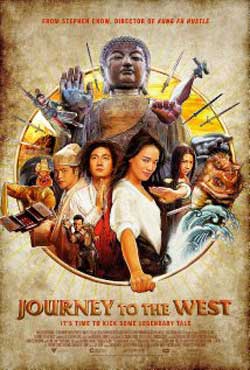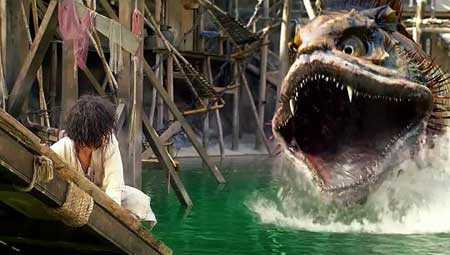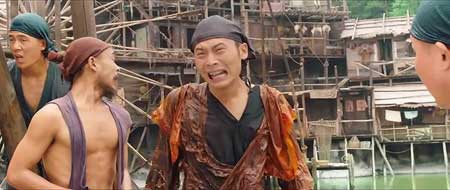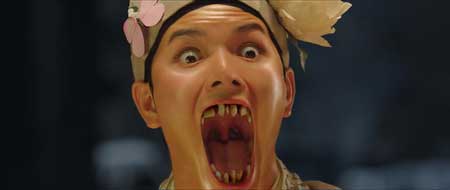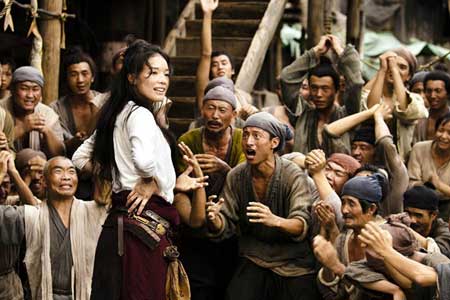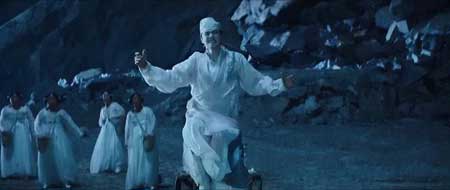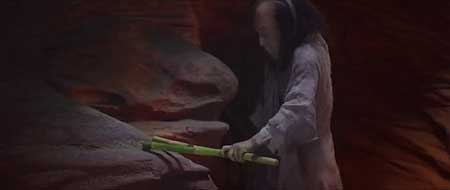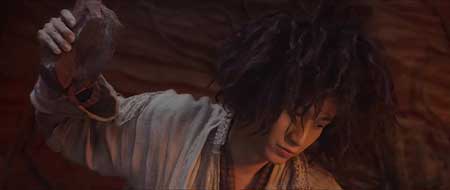SYNOPSIS:
Tang Sanzang, a Buddhist trying to protect a village from three demons, his emerging feelings for Miss Duan, the demon hunter who helps him repeatedly, and Sanzang’s trans-formative encounter with the Monkey King.
REVIEW:
Sitting down to watch a foreign-made film is always a bit of a crapshoot. Some are breathtaking in their breadth and scope, others are wastes of celluloid. “Journey to the West: Conquering the Demons” falls somewhere in between. The opening of the movie, a bad computer generated view swooping down to a shot of a village set was so jarring that I was originally wondering if the film was an animated effort. It isn’t.
We are introduced to a fisherman and his daughter and he advises her to stay out of the water for fear of demons. He slips, unseen, into the water and lunges up to startle her. You can imagine what happens next. The attack on the fisherman is a combination of horror and comedy that doesn’t blend well, and it sets the pace for the entire film to come.
The hero of the film, Xuan Zang, introduces himself as “the unshaven Buddhist monk.” It is an odd, awkward, introduction for the protagonist. It gets worse with some of the attempts at levity such as,
“Have you ever lost a husband?”
“I assure you that I have never lost a husband.”
The sort of gay panic and homophobic humor that runs through this film feels dated. This sort of humor was mainstream in the US in the 70’s-90’s but is mostly gone now from serious attempts at filmmaking. The cultural divides here are very plain to see. One must actively decide to put them aside else enjoying the film is impossible. As it stands, the general level of humor in the opening twenty minutes are on par with the old Robin Williams movie Popeye (the special effects aren’t much better). There is use of running gag, and some passing visual effects, but the whole thing seems disjointed and rushed.
That feeling is something viewers of this movie will become accustomed to. After a twenty minute comedic action scene and a short musical number, we are introduced to the bad-ass femme fatale demon hunter who is the love interest for the film. Oddly, she goes from a strong woman to a crazed, simpering, psycho at the drop of a hat. As soon as we know that she is interested in Xuan, she becomes crazy…seriously unhinged. Any relationship with this woman would not be a healthy one.
Xuan’s method of attempting to deal with demons is a book of nursery rhymes, in an attempt to bring their inherent goodness to the fore. We don’t see a whole lot of that in this film. His rival, Miss Duan, does kick some serious ass though, and her action sequences are cheesy Chinese action film goodness. Watching her whallop demons is great fun.
But the second demon sequence seems even more disjointed. We are introduced to an inn, as a betrothed couple enters and are shown around, unknowing that a demon lurks, waiting for them. As the heroes arrive it feels like a wholly different movie, or a new episode in a television program. This is a better sequence than the fishing village, but not a smooth transition. A number of gay jokes later, we move on as Xuan travels through the woods. Nothing really resolved and the film drifts as Miss Duan gets crazier and crazier. Frankly, her behavior is that of an abusive relationship and the idea of anyone wanting to be with her based on her actions is a bit…frightening. Still, Xuan falls in love with her, while protesting against it in his quest for the “Greater Love” of the Buddha.
It isn’t until the fourth act that the movie gets good, and it does get good. After having met other demon hunters (each more colorful than the last) Xuan travels to the prison of the Monkey King so as to learn how to deal with a rampaging demon which is too powerful to best. The Monkey King begins as a weak and pleading character, but keeps evolving and changing as he moves from deception to deception. The Chinese trickster, he plays the role to the hilt and, when he is finally revealed in his true form, it is easy to forgive the prior poor effects. He looks great. The final battle that rages is fantastic with Miss Duan engaging the Monkey King directly as Xuan clings to the teachings of the Buddha.
The finale of the film is fantastic in the truest sense of the word and the tale takes the turn down the road of Chinese mythology (Xuan Zang is also a character from Chinese mythology, something I had been unaware of when sitting down to watch). The end of the film, so different from a Western ending, yet still harkening to one, is wholly satisfying. We are given a conclusion that gives us a better appreciation for the old tales of China, and it is a satisfying end. It is a rocky road to get there, but it is a worthwhile journey.
Three out of five stars.
 Horror News | HNN Official Site | Horror Movies,Trailers, Reviews
Horror News | HNN Official Site | Horror Movies,Trailers, Reviews
